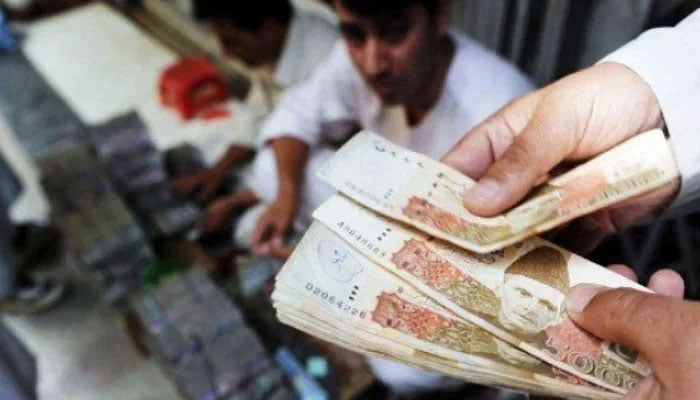Recovery budget
The federal budget for the fiscal year 2024-25, recently approved by parliament, marks the beginning of the Shehbaz Sharif-led government's ambitious economic plan to tackle Pakistan's monumental challenges.
Despite relentless criticism, it is crucial to acknowledge that this administration has pulled Pakistan back from the brink of default.
Prime Minister Shehbaz Sharif has pledged that the ongoing discussions with the IMF will be the country's last, setting a bold goal for economic self-sufficiency that has eluded Pakistan for decades.
Over the years, Pakistan has sought nearly two dozen IMF bailouts. Breaking free from this cycle is a dream shared by many -- a dream that requires disciplined economic decisions to transform into reality.
Critics seem either unaware or intentionally dismissive of the policies and decisions needed as well as the prime minister’s efforts to shield the populace from further financial strain.
One of the key criticisms has been the government's handling of taxes amidst negotiations with the IMF. Meeting tough conditions of the IMF has always resulted in unpopular decisions but the PM played a pivotal role in minimizing the tax burden on the general populace.
"The IMF asked for imposing more taxes, but the PM refused to accept that," Information Minister Atta Tarar highlighted in a recent press conference. He emphasized that the prime minister, deeply involved in the consultation process, made bold decisions that prioritized the nation's stability over political gain.
The 2024-25 budget reflects this mission of reducing reliance on the IMF. Significant measures have been proposed to ensure that those with the capacity to contribute do so, while the underprivileged are shielded from additional burdens. The minimum wage was increased by up to 15 per cent, providing relief to the working class.
The critics are also oblivious to the fact that the government rejected demands for more taxes, ensuring no taxes were imposed on solar panels, textbooks, pesticides, and fertilizers.
The budget for fiscal year 2024-25 has exempted charitable hospitals from taxes, recognizing their crucial role in society. Credit for this particular step goes to the prime minister who made sure that there are no taxes on these entities. Similarly, health equipment, such as stents, was exempted from taxes, facilitating better medical care.
When it comes to industry, a relief package was announced offering electricity at Rs38 per unit to support industries in competing regionally and internationally.
Among several misconceptions about the recently approved budget, it is being propagated that new taxes have been imposed on the exporters. This is utterly not true because the taxation would only be on the profits.
Besides these measures, the government is pursuing downsizing and digitization to enhance efficiency and reduce costs. Additionally, the government has made it clear that loss-making state-owned enterprises will be privatized, providing relief to taxpayers who have shouldered the burden of these entities with their hard-earned resources for decades.
Prime Minister Shehbaz Sharif's vision is not just about immediate relief but also about long-term economic stability. And the government’s plans have already begun to show positive results.
The trade deficit has been reduced, foreign exchange reserves are increasing, and the stock exchange recently hit a new record of 78,000 points, reflecting market confidence in the budget and economic direction.
This budget is a step in the right direction. The business community and market reactions affirm the positive outlook.
The writer is a PML-N politician.
-
 Andrew, Sarah Ferguson Refuse King Charles Request: 'Raising Eyebrows Inside Palace'
Andrew, Sarah Ferguson Refuse King Charles Request: 'Raising Eyebrows Inside Palace' -
 Adam Sandler Reveals How Tom Cruise Introduced Him To Paul Thomas Anderson
Adam Sandler Reveals How Tom Cruise Introduced Him To Paul Thomas Anderson -
 Washington Post CEO William Lewis Resigns After Sweeping Layoffs
Washington Post CEO William Lewis Resigns After Sweeping Layoffs -
 North Korea To Hold 9th Workers’ Party Congress In Late February
North Korea To Hold 9th Workers’ Party Congress In Late February -
 All You Need To Know Guide To Rosacea
All You Need To Know Guide To Rosacea -
 Princess Diana's Brother 'handed Over' Althorp House To Marion And Her Family
Princess Diana's Brother 'handed Over' Althorp House To Marion And Her Family -
 Trump Mobile T1 Phone Resurfaces With New Specs, Higher Price
Trump Mobile T1 Phone Resurfaces With New Specs, Higher Price -
 Factory Explosion In North China Leaves Eight Dead
Factory Explosion In North China Leaves Eight Dead -
 Blac Chyna Opens Up About Her Kids: ‘Disturb Their Inner Child'
Blac Chyna Opens Up About Her Kids: ‘Disturb Their Inner Child' -
 Winter Olympics 2026: Milan Protestors Rally Against The Games As Environmentally, Economically ‘unsustainable’
Winter Olympics 2026: Milan Protestors Rally Against The Games As Environmentally, Economically ‘unsustainable’ -
 How Long Is The Super Bowl? Average Game Time And Halftime Show Explained
How Long Is The Super Bowl? Average Game Time And Halftime Show Explained -
 Natasha Bure Makes Stunning Confession About Her Marriage To Bradley Steven Perry
Natasha Bure Makes Stunning Confession About Her Marriage To Bradley Steven Perry -
 ChatGPT Caricature Prompts Are Going Viral. Here’s List You Must Try
ChatGPT Caricature Prompts Are Going Viral. Here’s List You Must Try -
 James Pearce Jr. Arrested In Florida After Alleged Domestic Dispute, Falcons Respond
James Pearce Jr. Arrested In Florida After Alleged Domestic Dispute, Falcons Respond -
 Cavaliers Vs Kings: James Harden Shines Late In Cleveland Debut Win
Cavaliers Vs Kings: James Harden Shines Late In Cleveland Debut Win -
 2026 Winter Olympics Snowboarding: Su Yiming Wins Bronze And Completes Medal Set
2026 Winter Olympics Snowboarding: Su Yiming Wins Bronze And Completes Medal Set




